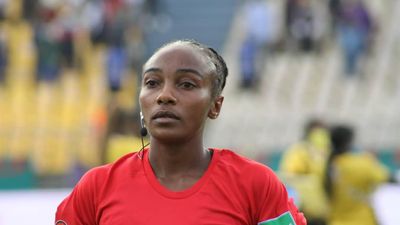The Rwandan Woman Who Made Football History
We talked to Rwandan referee Salima Mukansanga, who is the first woman to officiate a match in the Africa Cup of Nations' 65-year history.
On the 18th of January, 2022, a woman stepped into the Ahmadou Ahidjo Stadium in Yaoundé, Cameroon, whistle in hand, a walkie-talkie tucked behind her shorts. Taking up her post as central referee for the Zimbabwe-Guinea game, she would make history as the first woman to officiate a match in the Africa Cup of Nations. Chit-chat occupied the stands, as spectators waited for the curtains to be drawn at 17:00 hours for the match to begin. Whispers of “Hope she will deliver,” could be heard, as Salima Mukansanga prepared to take to the field.
During the match, some spectators counted the 34 yellow cards she handed out at the end; others found her soft and tender with no serious refereeing issues in the game. Mukansanga leads a quartet of women match officials for this year's AFCON, with Carine Atemzabong, from Cameroon, Fatiha Jermoumi and Bouchra Karboubi, both from Morocco, present as assistant referees. Until this year’s tournament, in its 65-year history, an all-women team of refereeing officials had yet to be designated for an Africa Cup of Nations match.
With this accomplishment, 35-year-old Mukansanga has emerged as a trailblazer for other women who aspire to step out and break sporting bounds. Her role in this year’s tournament signals a major moment in the development of women refereeing in football, on the continent and for the sport as a whole.
When asked how she felt about being the first to reach the pinnacle of football refereeing, she smiled. "It is an honor for me and the other African female referees," Mukansanga told OkayAfrica, at a press conference held by the tournament’s organizers, Confederation of African Football (CAF), in the days following that Tuesday’s match.
Setting the pace is “a moment and an opportunity to open doors, an indication that all African women are capable; they can reach heights, deliver and get ready for the next step,” continued Mukansanga. “I appreciate the support from CAF, following us back home since the beginning, and most of us have been officiating in our Premier Leagues."
Hailing from Rusizi district in the Western region of Rwanda, Mukansanga holds a bachelor’s degree in Nursing and Midwifery from the University of Gitwe, located in Rwanda’s South Province, Ruhango District. "Growing up, I played basketball, but equipment and infrastructure stopped the dream," she says. She loved and played football for fun, not at a high or professional level. But it was during her final year of school that she officiated a game and her path to football refereeing had its start.
"I loved football so much that I wanted to remain in the circle,” says Mukansanga. It is this love for football that pushed her to get close to the Rwandan Football Federation, which helped her make baby steps in refereeing. After spending time learning the basics in refereeing and finishing school, she began officiating in the men’s Second Division league and the women’s top-tier league.
In 2012, she was promoted to become a CAF-licensed referee, and this is when she started officiating in matches across Africa. Along the way, Mukansanga did not let anything discourage her – not even the belief that refereeing would not be able to foot her bills. Rather, this spurred her desire to step up her game and do all she needed to do to make an impact.
However, she had to battle with the dress code, which was not in line with some cultural beliefs and religion, and pushback from the role being traditionally assigned to men. Women referees have been known to deal with sexism from players and spectators, as well as a lack of recruitment opportunities. But Mukansanga forged ahead, becoming a constant presence in the men’s league matches in her home country of Rwanda.
The great leap came for Mukansanga as a FIFA-certified referee on assignment for international competitions. Her growth was tremendous, from fourth official to referee, and within two years, she was on target to be the referee for the Zambia and Tanzania match in 2014, a qualifier for the 2014 African Women's Championship. It was her first time as a central referee in an international match. She continued to break sporting boundaries when she became the first woman to umpire a men’s tournament at the U-17 Africa Cup of Nations.
Other notable achievements under her belt include the 2016 Africa Women’s Cup of Nations, the Women’s World Cup in France in 2019 and the Olympic Games. Before the Zimbabwe-Guinea game of this year’s Afcon, which Zimbabwe won 2-1, Mukansanga was handed a side role in the Malawi-Guinea encounter at the Bafoussam Kouekong stadium, in the West region of Cameroon.
"We are extremely proud of Salima because she has worked hard to be where she is today," says CAF director of refereeing, Eddy Maillet. "We know that she had to overcome serious obstacles to reach this far and she deserves credit."
- The Barbra Banda Case Shows Black Women Aren't Allowed to Be Too Strong - OkayAfrica ›
- The Barbra Banda Ban Shows Black Women Aren't Allowed to Be Too Strong - OkayAfrica ›
- Sadio Mane Will Be Joining Senegal Squad for World Cup Despite Injury - OkayAfrica ›
- Sadio Mane Ruled Out of the World Cup Through Injury - OkayAfrica ›
- Barbra Banda Named BBC Women’s Footballer of the Year 2024 - Okayplayer ›
